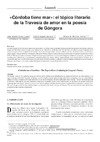Identificador persistente para citar o vincular este elemento:
https://accedacris.ulpgc.es/jspui/handle/10553/72179
| Campo DC | Valor | idioma |
|---|---|---|
| dc.contributor.author | Gómez Luque, Juan Antonio | en_US |
| dc.contributor.author | Laguna Mariscal, Gabriel | en_US |
| dc.contributor.author | Martínez Sariego, Mónica María | en_US |
| dc.date.accessioned | 2020-05-07T15:19:19Z | - |
| dc.date.available | 2020-05-07T15:19:19Z | - |
| dc.date.issued | 2016 | en_US |
| dc.identifier.issn | 1575-2100 | en_US |
| dc.identifier.other | WoS | - |
| dc.identifier.uri | https://accedacris.ulpgc.es/handle/10553/72179 | - |
| dc.description.abstract | The literary topos of love seafaring (navigium amoris) can be defined as the identification or comparison between love and seafaring. As a topos, it sprung in Classical literature, including a set of six motifs: twofold nature of Aphrodite-Venus, comparison of sexual relationship to sailing or rowing, comparison of woman and/or love to sea, the love tempest, arrival to harbor and votive offerings. From its classical origin and by Petrarch's intervention, the topos featured conspicuously in Spanish poetry of the Golden period. In this paper the presence of the love seafaring topos in Gongora's poetry is surveyed, its function analyzed and the classical sources examined from a comparative point of view. The aim is to prove that the love seafaring topos was relevant in the poetic universe of Gongora. This poet develops the topos both with a comparative and a symbolic implication. | en_US |
| dc.description.abstract | El tópico literario de la Travesía de amor (navigium amoris) se define como la asimilación figurada entre navegación y sentimiento amoroso. Surgió en la literatura clásica y consta de un conjunto de seis submotivos: doble faceta de Afrodita-Venus, la relación sexual comparada con el acto de navegar o remar, comparación de la mujer con el mar, la tempestad del amor, la arribada a puerto y la ofrenda votiva. A partir de ese origen clásico y gracias también a la mediación cultural de Petrarca, el motivo alcanza una presencia relevante en la poesía española de los siglos XVI y XVII. En este trabajo rastreamos el tópico de la navegación del amor en la poesía de Góngora, estudiamos su función y sus elementos constituyentes (submotivos), y examinamos comparativamente las fuentes clásicas (especialmente, en la poesía latina). El tópico de la Travesía de amor tuvo un importante desarrollo en la poesía del poeta cordobés y contribuyó sustancialmente a configurar su universo poético. Góngora trata el tópico como un procedimiento figurado e igualmente con una dimensión simbólica. | en_US |
| dc.language | spa | en_US |
| dc.relation.ispartof | Ambitos-Revista De Estudios De Ciencias Sociales Y Humanidades | en_US |
| dc.source | Ambitos-Revista De Estudios De Ciencias Sociales Y Humanidades [ISSN 1575-2100] (36), p. 75-85 | en_US |
| dc.subject | 6202 Teoría, análisis y crítica literarias | en_US |
| dc.subject.other | Poetry | en_US |
| dc.subject.other | Gongora | en_US |
| dc.subject.other | Topos | en_US |
| dc.subject.other | Sailing | en_US |
| dc.subject.other | Seafaring | en_US |
| dc.subject.other | Love | en_US |
| dc.subject.other | Góngora | en_US |
| dc.subject.other | Poesía | en_US |
| dc.subject.other | Tópico | en_US |
| dc.subject.other | Navegación | en_US |
| dc.subject.other | Amor | en_US |
| dc.title | Córdoba tiene mar: el tópico literario de la Travesía de amor en la poesía de Góngora | en_US |
| dc.title.alternative | "Cordoba has a Coastline" : The Topos of Love Seafaring in Gongora's Poetry | en_US |
| dc.type | info:eu-repo/semantics/Article | en_US |
| dc.type | Article | en_US |
| dc.identifier.isi | 000407833600008 | - |
| dc.description.lastpage | 85 | en_US |
| dc.identifier.issue | 36 | - |
| dc.description.firstpage | 75 | en_US |
| dc.investigacion | Artes y Humanidades | en_US |
| dc.type2 | Artículo | en_US |
| dc.contributor.daisngid | 4294309 | - |
| dc.contributor.daisngid | 4046617 | - |
| dc.contributor.daisngid | 3446538 | - |
| dc.description.numberofpages | 11 | en_US |
| dc.utils.revision | Sí | en_US |
| dc.contributor.wosstandard | WOS:Luque, JAG | - |
| dc.contributor.wosstandard | WOS:Mariscal, GL | - |
| dc.contributor.wosstandard | WOS:Sariego, MMM | - |
| dc.date.coverdate | 2016 | en_US |
| dc.identifier.ulpgc | Sí | es |
| dc.description.esci | ESCI | |
| dc.description.erihplus | ERIH PLUS | |
| item.fulltext | Con texto completo | - |
| item.grantfulltext | open | - |
| crisitem.author.dept | GIR Estudios sobre humanismo, filología y pervivencia clásicas y literatura canaria | - |
| crisitem.author.dept | Departamento de Filología Hispánica, Clásica y de Estudios Árabes y Orientales | - |
| crisitem.author.orcid | 0000-0002-7541-3147 | - |
| crisitem.author.parentorg | Departamento de Filología Hispánica, Clásica y de Estudios Árabes y Orientales | - |
| crisitem.author.fullName | Martínez Sariego, Mónica María | - |
| Colección: | Artículos | |
Visitas
195
actualizado el 09-ene-2026
Descargas
363
actualizado el 09-ene-2026
Google ScholarTM
Verifica
Comparte
Exporta metadatos
Los elementos en ULPGC accedaCRIS están protegidos por derechos de autor con todos los derechos reservados, a menos que se indique lo contrario.
